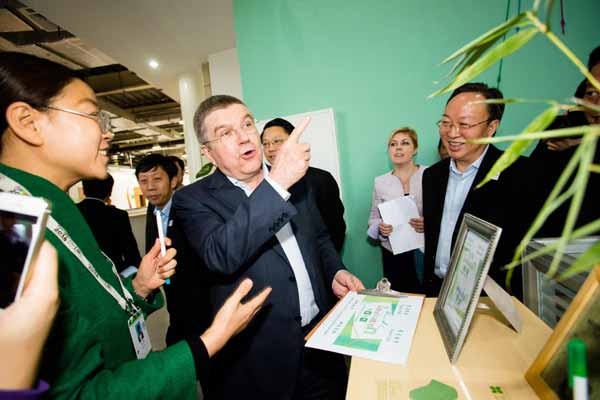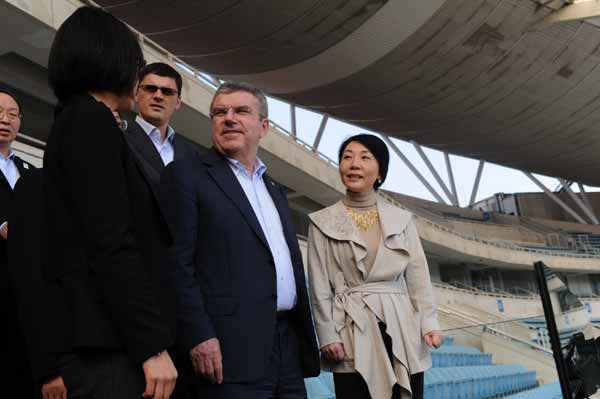|
 International Olympic Committee President Thomas Bach (C) inspects the preparation work of the 2014 Summer Youth Games in Nanjing of East China's Jiangsu province November 18, 2013. [Photo/Xinhua] |
NANJING - International Olympic Committee President Thomas Bach said here on Monday that he was not upset with a vote by residents against Munich's bid to host the 2022 Winter Games.
All four districts in the potential Munich bid returned "no" vote in a referendum held on November 10. Opponents were concerned about environmental issues and high costs.
When asked if he feels upset by the vote, Bach said: "Not upset. This is what can happen in Germany. It's one of the long series of referendums...Just a couple of months ago, the citizens in Munich voted against a runway in the airport with much higher participation. Then in this one (Olympic bid), you have to see the participation was very limited, so you cannot speak of real majority, the overall population."
"I hope in the future German citizens will be more courageous again," added the former head of the German Olympic Committee.
Six candidates are now in the running for the 2022 Games. They are Stockholm; Oslo; Lviv (Ukraine); Beijing and the northern Chinese city of Zhangjiakou; Almaty, Kazakhstan; and a joint bid from Krakow, Poland, and Jasna, Slovakia.
Bach, who is on a two-day visit to China, said that the IOC is delighted about Beijing's attempt to become the first city to host the Summer and Winter Olympics, after staging the 2008 Summer Games.
"We are very pleased to receive this candidature (from Beijing and Zhangjiakou), because it offers a new approach to the Winter Games, offering winter sports a capital like Beijing and to the people all over China. It's a very interesting project," he said.
But with the 2018 Winter Olympics to be staged in South Korea's Pyeongchang and the 2020 Summer Games in Tokyo, there has been speculation that Beijing stands little chance of winning in the 2022 bid.
|
 International Olympic Committee President Thomas Bach (C) inspects the preparation work of the 2014 Summer Youth Games in Nanjing of East China's Jiangsu province November 18, 2013. [Photo/Xinhua] |
Bach denied that there is a rotation of continents policy when the IOC members choose the host city.
"I think the IOC members look at the bid individually. Of course, overall, we want to be a universal movement and address different continents. But this has nothing to do with individual decisions," said the IOC chief.
Also on Monday morning, Bach inspected the athletes village and the Olympic sports complex for next year's Summer Youth Games in Nanjing.
"I've got very positive report that the organization is running very, very smoothly. We're confident that we will have great Olympic Youth Games here and also the public in Nanjing will enjoy the presence of the youth of the world," Bach told reporters.
Although some are worried about the future of the Youth Olympic Games, which was the brainchild of Bach's predecessor, Jacques Rogge, Bach said he believes this ambitious undertaking will mature gradually.
"We have seen two great successes so far in Singapore and Innsbruck. We are sure that Nanjing 2014 will be another great success ... On the other hand, after Nanjing, we have to access one way or the other how could the Youth Games be adapted," said Bach.
"One of the options is that to have modern youth sports being involved in the Youth Games and to open it up even more to the population to get the youth in the host city and the host country to practice sports with the young athletes being present, a program which has also been initiated by the Nanjing organizers."
With many sports eager to be added to the program of the Olympic Games, Bach said the IOC will discuss the composition of the Olympics program within the next couple of months.
"I think we have to respect two limitations - one is the number of athletes, the other is the number of permanent facilities. But within these two limitations, I think I can gain a little bit more flexibility to accommodate one or the other new discipline," he said.
An aim from Bach's presidential election manifesto was to reduce the cost of the Games. When asked if that means that bids from small and less developed cities, where they have to start from scratch, stand less chance of winning in the future, he said: "What we should do in the future a little bit more is asking potential candidate cities how they see the Olympic Games fit into their long-term development program, so to make the Olympic Games as sustainable as possible."
|
|
|
|
|
|
|
|
